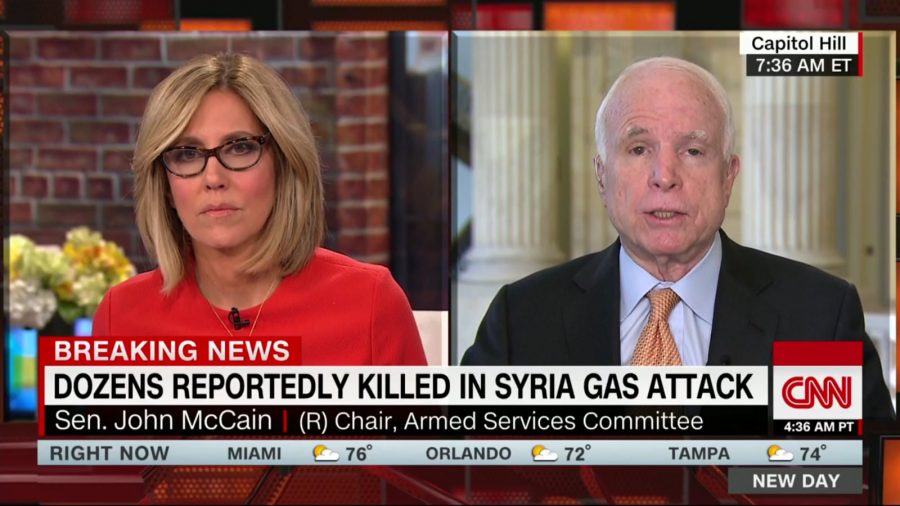President Trump carries out missile strike in Syria
Senator John McCain speaks about President Trump’s inaction in Syria previous to missile strike. Photo by Olivia Beavers, published on April 4, 2017, Some rights reserved, license link: https://creativecommons.org/licenses/by/2.0/, original link to work: https://www.flickr.com/photos/hinkelstone/33024557263/in/photolist-Sjgujk-fDVnTg-fDVnGH-fDVnPk-fEcYem-Q6KAzo-Qv5NUE-wHAt9D-DFMpGS-fEcXTY-fEcY33-fEcXWm-fEcXQ1-fDVnng-oPq8q4-T41z8h-xCa2E7-xF5R6X-xF6mL8-xnXTB2-xDD42j-xnRYk3-xC9XqW-xEtsmH-wHASdz-xnYpnV-wHAHBr-xnRWxL-xF6kD8-xC9LC3-xnYrd8-xEt2cp-xnY4jZ-xF69Xt-wHAzar-wHAGWZ-xDCDdC-xDD88f-xnS1AW-xDD2jS-xDCSH3-xnXYwc-wHAL64-xC9sAb-wHs8M9-wHAxMB-xC9YpE-xnXWQ6-xnRJ9Y-xF6gT2
Last Thursday, President Trump carried out a missile strike in response to the Syrian government’s chemical weapons attack that killed more than 80 civilians. The military action is a retaliation to Syrian gas attacks. Trump said that he was motivated by a graphic image he saw of the chemical attack’s effect on Syrian citizens. The event contradicts Trump’s previous promises in his campaign, going against his original “America First” policy.
The military sent 59 Tomahawk cruise missiles to the Al Shayrat airfield in Syria. The strike destroyed 20-25 aircraft (about 20 percent of Seventh Wing of Syrian air force) and became more symbolic as Trump established himself as a President who would leave more military action in the hands of the Pentagon and field commanders.
The foreign policy includes defeating ISIS as its top priority and the eventual removal of the Assad regime. It has been stated that the United States will intercede in Syrian affairs when chemical weapons are put into action or civilians are killed. It is unsure whether America’s focus is to fight terrorism, ease the humanitarian crisis, or restore stability into the war-torn area.
This event raised various concerns, especially considering the future relations with other countries. America’s relationship with Russia, in particular, has been majorly impacted.
The Kremlin called the attack a violation of international law and suspended a Russian-American agreement on air operation information. Russian Prime Minister Dmitri A. Medvedev said that the Russian-American relationship was completely ruined.
Russia pointed a finger at America, stating that many as 100 Russian troops were stationed at the Syrian air base. America countered by saying that the troops were given a 60 to 90 minute warning. In another instance, America pointed out a 2013 agreement that Russia was to rid Syria of chemical weapons, justifying the missile attack. Russia denied the existence of the chemical attacks, with Dmitri S. Peskov, a spokesman for Putin, saying “The Syrian Army has no chemical weapons at its disposal” and blaming Syrian rebels for planning a conventional weapons attack.
Russia is not the only country to have given its input on the attack. Various other countries have stated their views on the matter. Supporting America are its allies: Canada, Britain, Germany, France, Turkey, Israel, Saudi Arabia, Australia, Italy, Poland, The United Arab Emirates, and Japan. Condemning the strike are Syria, Russia, Iran, and Bolivia. China and Sweden have remained either unclear or neutral.
America has continued to use military action in Syria, with the military announcing that on Tuesday 18 allied fighters battling the Islamic State were struck in a misdirected airstrike in Northern Syria. Trump indicated that more military maneuvers will be left to the Pentagon and American commanders in the field rather than in the White House, unlike previous president Obama.
Your donation will help support The Lambert Post, Lambert High Schools student-run newspaper! Your contribution will allow us to purchase equipment and cover website hosting costs.








